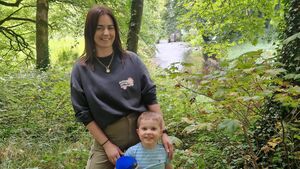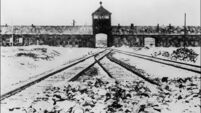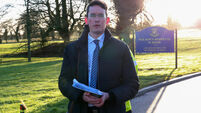'After surgery, I had to relearn how to read and write'

Michelle Filan is pictured with her son Coby.
Michelle Filan has come through the worst imaginable experience and is using that to assert a positive influence on others.
Michelle owned her own gym in Swinford and was involved in the health and fitness industry for 25 years. A health diagnosis immediately after the birth of her son led to unimaginable challenges but Michelle has come through and has gone down a different path but is still as invested as ever in helping people to achieve their goals.
We sat down to chat about her journey and where she is headed now.
Michelle, thanks for taking the time to talk to me. Tell me a little about yourself.
I’m originally from Westmeath – I grew up there. I met Liam, my now husband and a Mayo man, in Westmeath. We moved to Mayo in 2015. I’ve always been involved in health and fitness in some capacity. I’ve worked in gyms my whole life, and I played football with my club and my county. I suppose I’ve always had that background in health, fitness, and sport.
Liam and I have a little boy – Coby, who is four now - and we live just outside Swinford.
Going back to the health and fitness side of things, was that something that you always had an interest in?
My dad was actually a sergeant in the Defence Forces, so I always had in the back of my head that I was either going to join the army or go into health and fitness.
When I finished school, I went straight into studying health and fitness. I didn’t really hesitate or look around for something else. My first official paid job was in Longford in 2001, in the Longford Arms Hotel. That was a great experience. After that, I spent most of my time working in Athlone, at the Regional Sports Centre. I spent a lot of years there and met so many fabulous people.
At the same time, I was playing football, which was huge in my life. I played for my club, and later, for Westmeath. One of my proudest moments was winning the All-Ireland in 2011. That year, we won the league, the Leinster title, and the All-Ireland.
Then you moved to Mayo in 2015. Was that the next chapter of your career?
A lot changed for me after 2011. I had a bit of a 'What am I doing with my life?' moment when I turned 30. I’d been working in gyms my whole life, but I started thinking, 'Am I going to be jumping around on stage teaching classes forever?' So I decided to quit my job and try something different. I ended up in sales and recruitment, which was a great learning experience. That’s also where I met my husband. After a few years, we decided to settle in Mayo.
And that’s when you started your own business?
Yes. In January 2016, I became self-employed in Mayo. At first, it was just teaching a few classes and doing personal training.
Liam suggested I try a class in Swinford. I wasn’t sure at first - I didn’t know anyone locally - but I gave it a go. I remember walking into the Cultural Centre in Swinford with my stereo, and about 12 people showed up for the class. From there, it just grew. By 2019, the classes had become so popular that I opened my own gym.
Was that hugely successful for you, Michelle?
It was, but it came with challenges. Three months after opening the gym, my mum passed away. Losing a parent changes you forever. It’s hard to explain unless you’ve been through it, but it makes you reassess everything. Then, of course, Covid hit in 2020, and we had to close the gym two weeks before our first anniversary. At the same time, I was pregnant with Coby. He was born in November 2020, but two days later, I had a seizure in the hospital. He was breech, which was something that might have saved my life in the end because I didn’t have a natural labour.
Tell us a little about that if you don’t mind.
I remember putting Coby in his bassinet because I felt something was wrong, and then I blacked out. When I woke up, I was surrounded by doctors. They found I had an arteriovenous malformation (AVM) in my brain - a cluster of arteries and veins that could’ve caused a stroke. I could have had a bleed, I could have had a stroke, a haemorrhage at any stage - you're born with it. But it just so happened that through the pregnancy it kicked off. Looking back, Coby being breech probably saved my life because if I’d gone through natural labour, it could’ve been a very different story.
I remember waking up in the hospital and screaming the place down. I was never so terrified in my life as I was in that particular moment. And as I woke up, it was like the whole entire hospital of doctors and nurses were looking at me. Everyone had masks on because it was during the pandemic, and that also meant my husband wasn't allowed in for a lot of it.
I'll never forget Bernie, who was my midwife - an absolutely gorgeous nurse - was trying to look me in the eye and say, 'You're okay'. I couldn't remember where I was. I didn't know I'd had a baby. So it was really quite frantic at that time.
The whole experience must have been terrifying, Michelle.
It was tough. I was really ill. I was obviously kept in the hospital for a period and then they called out to me. The nurses were brilliant, I have to say. Because I'd had a seizure, I wasn't allowed to drive. So it meant now that I'm now living out in the country, I'm on my own, you're not allowed drive. I couldn't go anywhere, I couldn't do anything. And then there was the fear of, well, is she going to have another seizure? So I was on a lot of medication and things too. And they were ringing Dublin and Galway from Castlebar because Mayo University Hospital doesn’t have a neurology department.
I chose to go to Beaumont in Dublin. I ended up being under a neurologist, Dr Roland Kilbride. And my neurosurgeon was Professor Javapour and he was just brilliant, like, absolutely fantastic. He specialised in AVMs and they're so rare, which is really interesting. I would contact him with a bunch of questions and I’m sure he was thinking, 'Not this one again!'
So where did that bring you to Michelle?
Nine months after Coby was born, after numerous tests, they decided I needed to have open brain surgery. They did extra tests to see where your speech sensors are in your brain. And because I'm left-handed, the speech sensors are in a place that they don't want. So that meant then I had to be woken up during the surgery. I effectively had an awake craniotomy. They could wake me up and I could have a conversation and see if it was affecting my speech while they did the operation.
Everything went really well. I woke up after recovery. I was actually talking to Liam on the phone for a few minutes and thought everything was fine, but then I took a turn. I thought I was having a stroke. I could feel my face going, so they had to rush me off again. And then from there on, things kind of went downhill. So I had severe swelling on my brain, and at that point, I lost my speech. I had massive amounts of swelling on my face.
I was very practical at the time. I wrote letters to Liam and Coby the night before the operation when I was in hospital, just in case, because I didn't know how it was going to go. The medical people had warned me that I might not be the same person after the surgery.
I couldn't think. I couldn't gather my thoughts. I couldn't understand what people were saying to me. So I would literally be staring at you, but I didn’t know what you were saying. I couldn't write, so it meant I couldn't text, I couldn't read, I couldn't talk. For about the first week, I didn't speak to my husband or family at all because I couldn't.
So the entire month I was in Beaumont Hospital, nobody was ever let come into me. The nurses were lovely and they were as helpful as they could be during that time. It was really busy with Covid and the restrictions and all of that kind of stuff. So they did the best that they could, but you were very vulnerable and you were missing your new baby, you're missing your family, and you're on your own. I spent a month in the hospital, then three months in the National Rehabilitation Hospital in Dun Laoghaire. I couldn’t drive, couldn’t work, and had to relearn how to speak and write.
Michelle, it sounds horrendous.
It was a really bad and difficult time. Then I was put on medication which I later found out had massive implications on my mental health. It was an epileptic medication. I imagine it would have been tough mentally regardless, but I did not want to be here anymore. That is genuinely how bad it was and how bad it got.
It was only when I was put in touch with a group called Quest, who look after people with brain injuries and strokes in Galway, Roscommon, Mayo that I began to realise what was wrong. I ended up speaking to one of the neuropsychologists there, two years after everything, and he was the one who picked up that that medication has massive implications. It doesn't affect everyone the same. So he made the recommendation to my neurologist about changing my medication or coming off it because I hadn’t had any other seizures. And so he said I could come off the medication. And honestly, it was like I was like a different person.
And despite all that, you kept your business going too?
Yes, and I’m very proud of that. Even with everything going on, the business remained successful and profitable. I eventually sold it last year, which was a big milestone for me.
And now you’re onto something new?
Yes! I’ve started working for the Connacht LGFA as a development officer, which I absolutely love. I’m also a certified life coach and yoga and meditation teacher. It’s been about rediscovering what matters to me - connecting with people, helping them feel seen and supported.
What advice would you give to someone facing challenges or thinking about making a change?
Validate yourself. Don’t wait for others to do it for you. Life is unpredictable, but sometimes the biggest challenges can lead to the most rewarding changes. Find what drives you, lean into your strengths, and don’t be afraid to ask for help when you need it.




